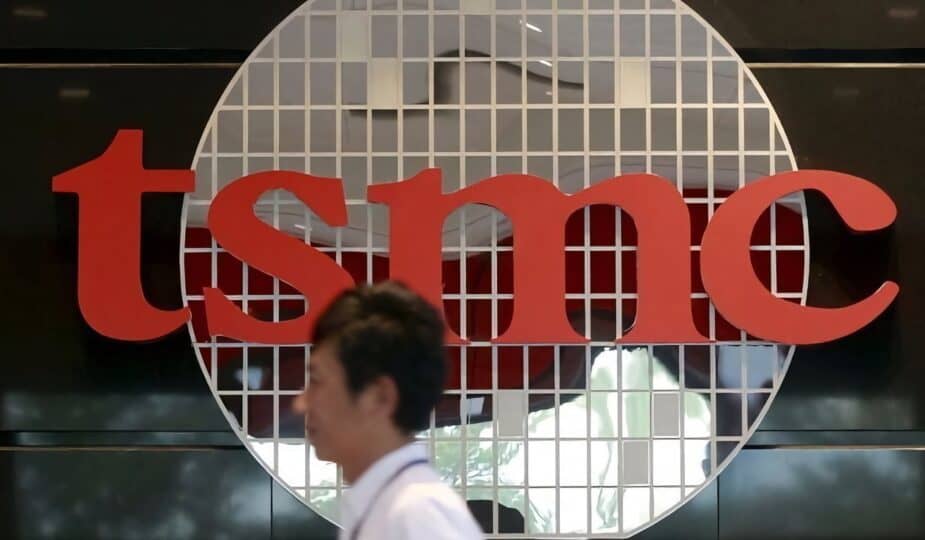TSMC factory sign – Image courtesy of TSMC
 0 Facebook x.com Reddit
0 Facebook x.com Reddit
US order for TSMC to stop shipping AI chips to China over Huawei sanctions won't cause problems for Apple But Taiwan’s ban on TSMC’s 2nm chip production elsewhere could have an impact.
US sanctions against Huawei have created problems for TSMC because of middlemen’s attempts to order certain AI-based chip designs on Huawei’s behalf. TSMC is suspending shipments of AI-focused chips to China starting Monday, following orders from the United States.
The Commerce Department has imposed export restrictions on certain chip designs that were destined for China, a source familiar with the matter told Reuters. The ban, which takes effect Monday, affects certain types of chips made using 7nm processes or advanced designs intended for AI or graphics processing.
TSMC has already informed affected customers of the export change and its implementation schedule.
The order is a natural extension of the Commerce Department’s investigation into TSMC’s inadvertent sanctions violation on Oct. 18. The investigation looked into whether TSMC knowingly supplied chips to Huawei and whether it knew that the middleman was working on Huawei's behalf.
While it was not immediately clear which company was working for Huawei, TSMC was cooperating with the Commerce Ministry. The chipmaker warned that there was an attempt to violate sanctions through an intermediary, and the investigation was looking into the method.
Reuters added that the intermediary was Sophgo, a Chinese chip designer. The chip matched the chip used in Huawei’s AI processor.
“TSMC regularly discusses export control issues with the government and has made it clear that it will comply with domestic and international regulations,” Taiwan’s Ministry of Economic Affairs said in a statement. TSMC also insists that it is a “law-abiding company” that “is committed to complying with all applicable rules and regulations, including applicable export controls.”
A Wider Impact, But Not for Apple
The Commerce Department's blocked shipments are certainly impacting TSMC's sales to Huawei, but it could also cause other problems.
For starters, a complete ban on supplying AI chips to other Chinese firms, or to chip designers who may supply other firms but could potentially do the same to Huawei, is cutting into TSMC’s sales and supply.
While TSMC is a highly sought-after chip maker, this still means an immediate drop in chip production, as the U.S. is preventing it from fulfilling some of its orders.
Lower production means it will have to move its production line to maximize the usefulness of its facilities. As for its relatively new Arizona manufacturing plant, its relatively low production volume may make it a viable facility for temporary mothballing.
While this order largely temporarily risks the investment in Arizona, it likely won’t hurt the company’s supply to Apple much.
Apple relies on assembly partners in China to make its products, including the iPhone, and so TSMC chips must be imported. Because the chips have AI benefits in the form of the Neural Engine, they are the type of chips the Commerce Department is wary of handing over to Huawei.
However, with the exception of a small number of A16 chips made at a plant in Arizona, the vast majority of its chips are made elsewhere, including Taiwan.
Advanced, but only in Taiwan
While there is an intention to make Apple chips in the United States at TSMC's Arizona plant, this will not necessarily result in the production of advanced chips.
Taiwan's Economy Minister J.W. Kuo said on Thursday that TSMC should continue to make chips using the latest manufacturing processes in its home country, the Taipei Times reported. Specifically, making chips using a 2-nanometer process.
“Because Taiwan has regulations in place to protect its own technology, TSMC cannot currently produce 2-nanometer chips overseas,” Kuo told the Taipei Economic Committee. “Although TSMC plans to produce 2-nanometer chips [overseas] in the future, its core technology will remain in Taiwan.”
Kuo’s comments were in response to claims that TSMC may be forced to produce chips using advanced 2-nanometer processes ahead of schedule following President-elect Donald Trump’s election victory.
The A17 Pro and A18 chips are currently made using a 3-nanometer process. However, the iPhone 18 Pro is believed to feature chips using a 2-nanometer process.
Under Taiwanese law, domestic chipmakers are allowed to make chips elsewhere. The problem is that they would have to lag at least one generation behind the fabs operating in Taiwan.
TSMC currently plans to produce 2-nanometer and higher-end chips at its Arizona facilities by 2030, according to the company’s roadmap.
The first plant is scheduled to ramp up production of 4-nanometer chips next month. The second plant, set to come online in 2028, will run 3-nanometer and 2-nanometer lines, while the third will handle 2-nanometer and lower technologies.
Unless Taiwan changes its laws, TSMC will have to build and use even more advanced manufacturing processes to allow 2-nanometer chip production to begin in the United States.
For Apple, that means it can’t take advantage of TSMC’s new processes for any chips it makes in the United States. Instead, it will have to rely on TSMC's slightly older technology for U.S. manufacturing, while maintaining existing non-U.S. manufacturing for the fastest, newest chips.
Follow AppleInsider on Google News








